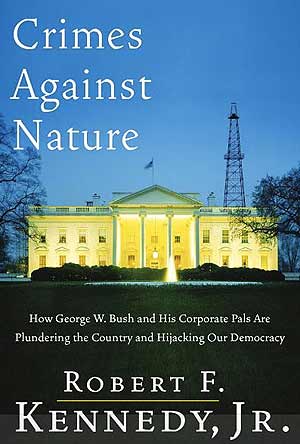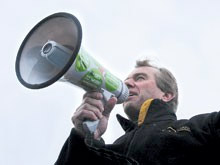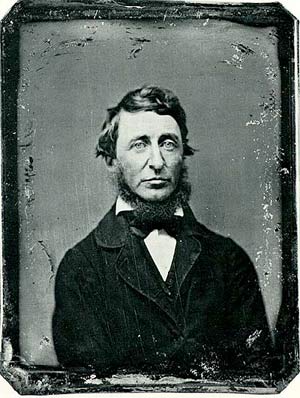Biblio
In this powerful and far-reaching indictment of George W. Bush's White House, Robert F. Kennedy, Jr., the country's most prominent environmental attorney, charges that this administration has taken corporate cronyism to such unprecedented heights that it now threatens our health, our national security, and democracy as we know it... --from the book jacket.
Robert Kennedy Jr. says we the people have the right to protect our commons.
Photo by Shadia Fayne WoodSee: Sarah van Gelder. Yes Magazine. May 27, 2010. "Protecting our Water Commons: Interview with Robert Kennedy Jr."
van Gelder: How important is the public trust doctrine in enforcing the idea that the waters are a commons and that ordinary people have a right to it?
Kennedy: There are two ancient laws that underlie all modern environmental laws: One is the nuisance doctrine that essentially says you can use your property any way you want, but if you pollute and it escapes your property and goes onto somebody else’s property, you’re violating the law.
The other is the public trust doctrine, which says you can’t do anything that is going to diminish the commons, which includes any property that is not susceptible to private property ownership, like air, water, the fisheries, wetlands, wildlife, the wandering animals, rivers, streams, shorelines, aquifers, underground rivers, etc. Everybody has the right to use the commons, but nobody can use them in a way that diminishes their use and enjoyment by others.
This is ancient law that goes back to Roman times when every citizen—rich or poor, humble or noble, African or European—had a right to cross the beach, throw in a net, and take out a share of the fish. And the emperor himself couldn’t stop them.
The first thing that happens in a tyranny is the privatization of the public trust by powerful entities...
See: Flow - The War Between Public Health and Private Interests
See: Robert F. Kennedy Jr. Feb. 19, 2004. The Nation. "The Junk Science of George W. Bush".
See: Robert F. Kennedy, Jr. Mobilizes on Mountaintop Removal
See: Mountaintop Removal Redux: Bobby vs. Blankenship II
See: New Starpower in the Fracking Fight
See Also:
Barlow, Maude. 2009. Blue Covenant: The Global Water Crisis and the Coming Battle for the Right to Water. The New Press, June 1.
Ivins, Molly. 2003. Bushwhacked : Life in George W. Bush's America. 1st ed. New York: Random House.
Shnayerson, Michael. 2008. Coal River. 1st ed. Farrar, Straus and Giroux, January 8.
Coalbed methane has rapidly become an important source of natural gas, particularly in the Inter-mountain West. The rapidity of its development has resulted in significant pressure on communities to deal with its environmental consequences.
Coalbed methane production often results in large quantities of water that are released as byproducts of production; in some cases, the water may inundate sensitive arid ecosystems, worsen surface water quality, and diminish undergroundwater supplies.
Noise, dust, and increased traffic; impairment of visibility and conflicts with recreation and other land use; impacts on wildlife and ecosystems; and other consequences of development have generated opposition in many communities.
Particularly vexing has been development on split estates, where surface owners do not own the mineral rights underneath their property and are required to cooperate with development that may disrupt the use and control of their land. This article examines the problems associated with coalbed methane development and offers a variety of suggestions for how conflicts could be reduced and how development could proceed in ways that are ecologically sustainable.
See: Hydraulic Fracturing Background Information | EPA (2004)
The Energy Policy Act passed by Congress in 2005 amended the Safe Drinking Water Act (SDWA) to exclude hydraulic fracturing fluids (except diesel fuel) related to energy production from regulation under the UIC program. States may choose to regulate hydraulic fracturing, however.
See: U.S. Environmental Protection Agency (EPA): Weston Wilson Whistle Blower Letter
See: Drilling Around the Law: Drinking Water Threatened by Toxic Natural Gas and Oil Drilling Chemicals
See: Hydraulic Fracturing of Oil and Gas Wells
See: Black Warrior Riverkeeper | Coalbed Methane
There are over four thousand coalbed methane wells in the Black Warrior River watershed. Tens of thousands of acres are leased to this practice, creating a massive network of roads and well pads. The extraction of coalbed methane involves a process known as hydraulic fracturing.
The Black River Watershed in Alabama provides water to over a million people.
See: Orion Magazine. November/December 2006. Taking On Goliath: Across the West, gas development is devastating land and people. | Now citizens are fighting back.
A Project in Cooperation with the Thoreau Society.
The Thoreau Reader - Annotated works of Henry David Thoreau
While Walden can be applied to almost anyone's life, "Civil Disobedience" is like a venerated architectural landmark: it is preserved and admired, and sometimes visited, but for most of us there are not many occasions when it can actually be used.
Still, although seldom mentioned without references to Gandhi or King, "Civil Disobedience" has more history than many suspect.
In the 1940's it was read by the Danish resistance, in the 1950's it was cherished by those who opposed McCarthyism, in the 1960's it was influential in the struggle against South African apartheid, and in the 1970's it was discovered by a new generation of anti-war activists. The lesson learned from all this experience is that Thoreau's ideas really do work, just as he imagined they would.
See: The Higher Law: Thoreau on Civil Disobedience and Reform by Henry David Thoreau, edited by Wendell Glick, with an introduction by Howard Zinn.
As a result of his writings and personal witness, we are the heirs of a legacy of creative protest. - Martin Luther King, Jr, Autobiography
This work is included in Fracking Resource Guide as an homage to the many individual voices and blogs I will continue to read that help the world stay informed about the dangers of hydrofracking.
I will join you at the barricades. Drilling isn't safe.
See: Essay by Peter Suber. "Civil Disobedience".
...The Nuremberg principles require disobedience to national laws or orders which violate international law, an overriding duty even in (perhaps especially in) a democracy.
- « first
- ‹ previous
- 1
- 2
- 3
- 4









